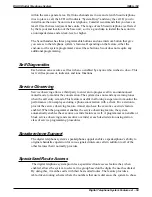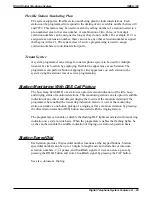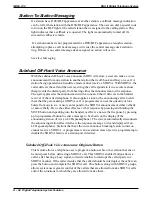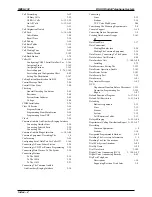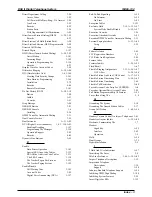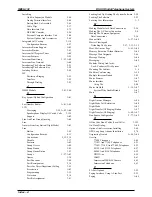
tables replace any that he or she may have assigned to the station for normal, or day
mode, operation. For example: a programmer can arrange for a station that has no other
toll restriction table assignment to receive a toll restriction table which will restrict
everything but local calls and will only take effect when the system is placed in the night
transfer (of ringing) mode. Therefore, even though users can make toll calls from this
station during daytime operation, they can make no toll calls from it when the attendant
programs the system for nighttime operation using the night transfer of ringing feature.
NOTE: Do not confuse this night mode toll restriction table assignment with the night
transfer (of ringing) feature.
Toll Restriction Override
The toll restriction override (TRO) feature allows users to override the toll restriction that
they encounter at other stations with their own station’s toll restriction assignments. In
programming for this feature, the programmer creates a four-digit TRO code that users
can dial to override the toll restrictions of any station that they happen to be using and
replace it with a toll restriction that matches their home station. After entering a TRO
code, a user gets his or her own prime line or idle line preference and its accompanying
toll restriction assignment. They then have 15 seconds to dial an outgoing call. Once they
hang up from a call, they have 15 seconds to make another call without having to re-enter
their TRO code. The system marks outgoing line calls that users make after entering a
TRO code with a (T) in its SMDR/SMDA printouts. The station number that it prints is
that of the overriding station and not the actual station that the call was made from. If a
user transfers a TRO call or places it on hold and picks it up at another station, the call
belongs to the new station.
Positive Disconnect Supervision
When a station is on line with an outside caller and the caller hangs up, the CO may send
a positive disconnect signal to the telephone system. A programmer can enable a positive
disconnect supervision feature on a per line basis. With this feature enabled when the
telephone system detects the CO’s positive disconnect signal, the system resets the toll
restriction, releases the current call record, and creates a new call record in its place.
Tone Or Voice Signaling (Intercom)
The system allows intercom calls to be tone signaled or voice signaled as the users
desire; however, the programmer uses system class of service programming procedures
to determine which signaling method the system will employed as the primary method.
Regardless of the programmer’s arrangement, telephone users can take action to use the
alternate method when they need it. See the paragraph titled Intercom Call Progress
Tones for a discussion of the intercom signaling tones.
See also, Intercom.
DSU II Digital Telephone System
IMI66–132
Digital Telephone System Features A – 69
Содержание DSU II
Страница 31: ......





